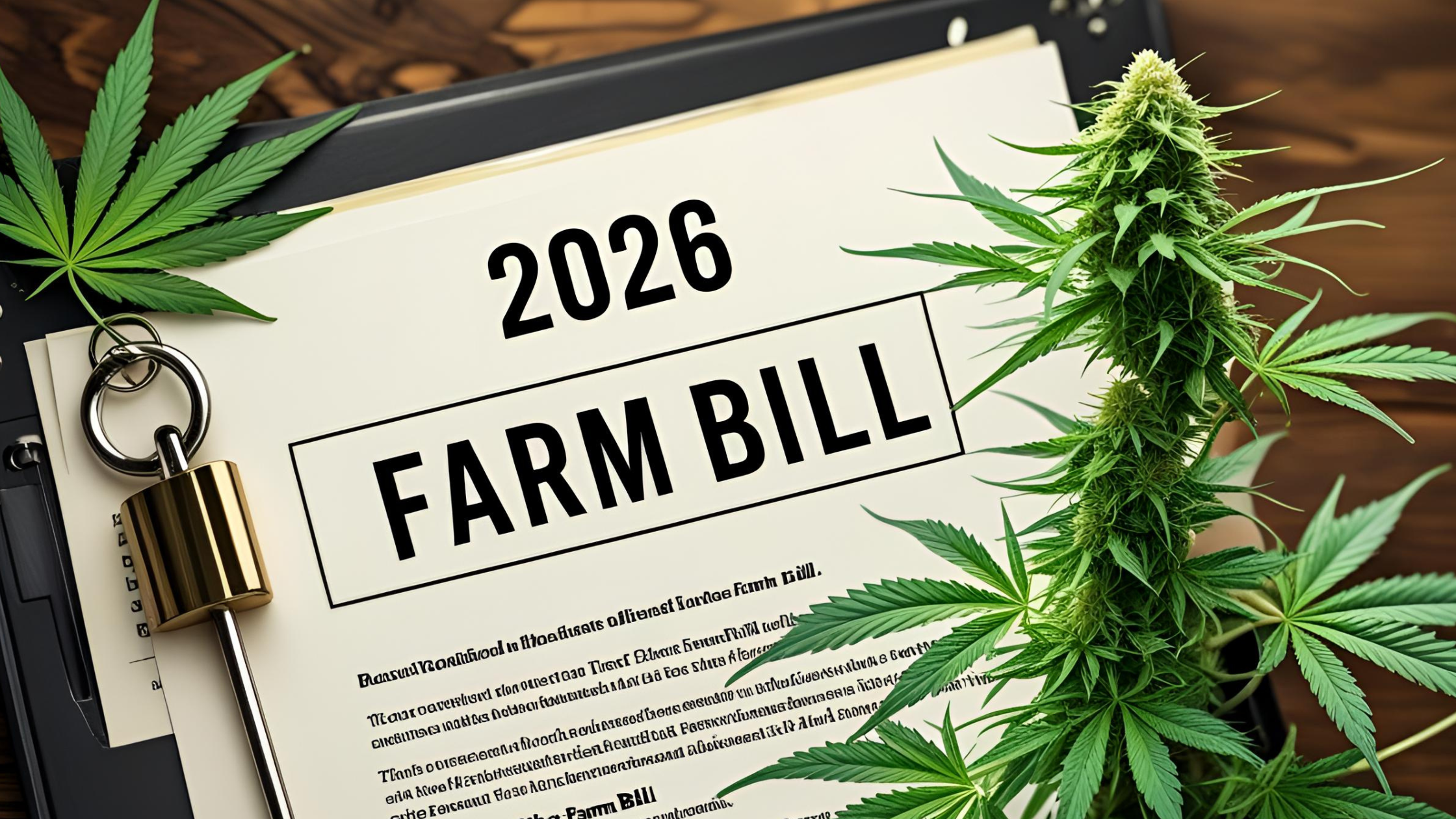
The Hidden Threat to Hemp: What's Really in the 2026 Farm Bill
The hemp industry faces its biggest challenge yet—and most people don't even know it's happening. Buried within the FY2026 Agriculture Appropriations Bill are provisions that could effectively eliminate the legal hemp market as we know it. This isn't just another regulatory adjustment; it's a potential economic disaster hiding in plain sight.
Congress is quietly working on legislation that would fundamentally redefine hemp, shift enforcement powers, and threaten thousands of jobs across America. The clock is ticking, with approximately 60 days before these changes could be slipped into a Continuing Resolution without public debate.
Let's examine what's actually happening, why it matters, and what you can do to protect an industry that supports countless families and communities nationwide.
What's Actually in the 2026 Farm Bill?
The FY2026 Agriculture Appropriations Bill contains language that would drastically alter how hemp is defined and regulated. These aren't minor tweaks—they're fundamental changes that could shut down entire sectors of the hemp industry.
The New Hemp Definition
Currently, hemp is defined as cannabis containing less than 0.3% Delta-9 THC. The proposed bill would expand this to include ALL THC isomers—Delta-8, Delta-10, THCA, and any other THC-related compounds. This change might sound technical, but its implications are massive.
Many legal hemp products contain trace amounts of these compounds naturally. Under the new definition, products that are perfectly legal today would become federally prohibited overnight.
The Synthetic Compound Ban
The bill also proposes banning synthetic or non-plant-derived cannabinoids, even if they contain less than 0.3% THC. This provision targets a growing segment of the hemp industry that has invested millions in research and development.
Zero Tolerance for THC-Like Compounds
Perhaps most concerning is the proposed prohibition on any "quantifiable amount" of THC-like compounds. This zero-tolerance approach ignores the reality of hemp cultivation and processing, where trace amounts of various compounds occur naturally.
The Enforcement Power Shift
One of the most significant changes in the proposed legislation is transferring enforcement authority from the USDA to the U.S. Department of Health and Human Services (HHS). This shift represents more than a bureaucratic reshuffling—it's a strategic move that could fundamentally alter how hemp regulations are implemented and enforced.
The USDA has agricultural expertise and understands the farming community's needs. HHS, while valuable for health-related matters, lacks the agricultural background necessary to make informed decisions about hemp cultivation and processing.
This transfer gives more control to bureaucrats who may not understand the complexities of hemp farming or the economic realities facing small businesses in this sector.
What Gets Protected and What Doesn't
The proposed legislation includes a crucial carve-out that reveals its true intentions. Hemp used for fiber, grain, oilseeds, and research would remain protected. However, cannabinoid-based wellness products—a multi-billion dollar market—would lose their legal status.
This selective protection suggests the changes aren't about hemp safety or agricultural concerns. Instead, they target the most profitable and innovative segments of the hemp industry while preserving traditional agricultural uses.
Thousands of businesses have invested in cannabinoid product development, manufacturing, and distribution. These companies, along with their employees and customers, would be left in limbo if the legislation passes.
The Timeline and Political Strategy
The proposed changes have already passed both House and Senate subcommittees, moving closer to becoming law. The real danger lies in how these provisions could be implemented—through a Continuing Resolution that receives minimal public scrutiny.
Congressional leaders attempted a similar maneuver in 2024, trying to slip anti-hemp language into must-pass legislation. Public pressure stopped that effort, but the same tactics are being used again.
The narrow window for action means that public awareness and engagement are crucial. Once these provisions are embedded in a Continuing Resolution, reversing them becomes exponentially more difficult.
The Real Motivation Behind These Changes
The push for these restrictive hemp regulations isn't driven by safety concerns or agricultural science. It's about eliminating competition in the cannabis market.
Large marijuana corporations view legal hemp as their biggest threat. Hemp products are often more affordable, more accessible, and subject to stricter quality controls than their marijuana counterparts. By redefining hemp out of existence, these corporations can eliminate their most significant competitor.
Corporate Influence vs. Small Business
The hemp industry consists largely of small businesses, family farms, and innovative startups. These companies have invested heavily in compliance, quality control, and product development. They've created jobs in rural communities and provided consumers with safe, legal alternatives.
In contrast, many large marijuana corporations have faced regulatory violations, failed safety tests, and engaged in questionable business practices. Yet they have the political influence and financial resources to push for legislation that benefits their interests at the expense of small businesses.
Testing and Quality Control
Hemp testing laboratories are federally accredited and operate under strict guidelines. They don't have the same conflicts of interest that plague marijuana testing facilities, which are often owned by the same companies they're supposed to regulate.
This independent testing ensures that hemp products meet safety standards and contain the compounds listed on their labels. Eliminating this market would force consumers toward less regulated alternatives or black market products.
Economic Impact and Real-World Consequences
The proposed legislation would have devastating economic consequences across multiple sectors and communities.
Job Losses and Economic Disruption
Thousands of jobs would be eliminated immediately if these provisions become law. Hemp farmers, processors, manufacturers, retailers, and service providers would all face significant losses.
Rural communities that have embraced hemp cultivation as an economic lifeline would be particularly hard hit. Many of these areas have struggled economically for decades, and hemp farming has provided new opportunities for growth and development.
Tax Revenue Collapse
Legal hemp businesses generate significant tax revenue for local, state, and federal governments. Eliminating this industry would not only cost jobs but also reduce the tax base in communities that can least afford it.
Consumer Safety Risks
Pushing consumers toward unregulated alternatives poses serious safety risks. Black market products don't undergo the same testing and quality control measures as legal hemp products. This could lead to contaminated or mislabeled products entering the market.
The Fight for Hemp's Future
American Healthy Alternatives and other advocacy organizations are working to prevent these damaging provisions from becoming law. Their efforts include lobbying Congress, educating the public, and building coalitions of affected stakeholders.
However, success requires broad public support. The hemp industry's fate shouldn't be decided behind closed doors by politicians influenced by corporate interests.
Legislative Solutions
Several approaches could address the concerns raised by hemp opponents while preserving the industry's viability:
-
Age restrictions on certain hemp products
-
Enhanced labeling requirements
-
Improved testing standards
-
Better enforcement of existing regulations
These solutions would address legitimate concerns without destroying an entire industry.
Public Education Campaign
Many Americans don't understand the difference between hemp and marijuana, or the benefits that legal hemp provides. Education campaigns can help the public make informed decisions about hemp policy.
Taking Action to Protect Hemp
The hemp industry's survival depends on immediate action from consumers, businesses, and advocates. Here's what you can do:
Contact Your Representatives
Call or write to your senators and representatives. Explain how the proposed changes would affect you, your community, or your business. Personal stories are often more effective than abstract policy arguments.
Support Advocacy Organizations
Groups like American Healthy Alternatives are fighting these provisions through lobbying, litigation, and public education. Your support helps fund these crucial efforts.
Raise Awareness
Share information about this issue with friends, family, and social media networks. Many people don't know about the threat to hemp, and awareness is the first step toward action.
Engage in the Political Process
Vote in elections at all levels of government. Support candidates who understand the importance of hemp and small business rights.
The Stakes Have Never Been Higher
The hemp industry stands at a crossroads. The decisions made in the coming weeks will determine whether this promising sector continues to grow and innovate, or whether it becomes another casualty of corporate influence and political maneuvering.
Hemp represents more than just another agricultural product—it's a symbol of American entrepreneurship, rural revitalization, and consumer choice. The fight to protect it is really a fight to protect the values that make our economy strong and our communities vibrant.
The time for action is now. The hemp industry's future—and the livelihoods of thousands of Americans—depends on what we do in the next 60 days. Don't let this vital industry be banned behind closed doors. Stand up, speak out, and help protect hemp for current and future generations.




